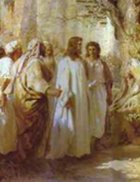Perceptions in the New Testament Times

.... In our previous section we discussed the Godhead as it was understood among the pagans in the Old Testament times. In this section we’ll describe what happened in the New Testament when the door of faith was opened to the Gentiles, and true Biblical teachings about the Person of God came forth to confront the old pagan views for the first time.
.... Recall Acts Chapter 17, when Paul entered Athens and saw how the entire city was given over to idolatry. His spirit was stirred within him. In instances like this, Christianity began to confront the old pagan ways for the first time in the New Testament age. As those Christian teachings reached the Gentiles and they began converting to the true faith in Jesus Christ, it still sent a back-wave through the church because of their old misunderstandings. Now this is hard to see when Paul is actually ministering, so let’s pick another example from Scripture: the epistle to the Colossians. And let’s begin with a little background so you can understand why this is more of a unique example:
.... Paul had taught a certain disciple named Epaphras, who came from the city of Colossae. After spending much time with Paul, he had returned to his home, to Colossae, and to two other towns that were in the immediate area: Laodicea and Hierapolis. In fact it was Epaphras who had started the churches in those three cities, rather than Paul himself, making them ‘second generation’ sort of churches if we may coin that phrase – though Paul did know some of the others who lived there, and may have passed through there briefly and stayed with some of them.
.... Now those three churches – Colossae, Laodicea and Hierapolis – were in an isolated corner of civilization. They had communication with each other, but as far as the mainstream of life, communication and commerce, they were fairly isolated from the rest of the world. They were also isolated from the other churches, and they were a second generation sort of church coming out of a purely pagan background. This created a breeding ground for trouble and that’s what ended up happening. Epaphras later had to leave the cities, return to find Paul, and obtain his help in writing the epistle to the Colossians in order to straighten things out.
.... Let’s take a look at what happened in those churches and see what went wrong. Remember that the Colossians, Hierapolans and Laodiceans had come from a pagan background. And what were the sort of terms they thought in? Caste systems of gods: that there’s many gods, there’s many goddesses, and there was a ruling triumvirate of gods at the top of this caste system. Now remember also, that Paul addresses this concept and said that it’s according to men, according to the basic traditions of this world, and not according to Christ – but anyway, that’s the sort of way they were accustomed to thinking; and when Christianity through Epaphras, this is sort of the transition that was made in their way of thinking:
.... Some of the Colossian Christians began to take all those lesser gods and goddesses, who had been a part of their mythology, and to see them as angels and demons: the good gods and goddesses were angels, the bad gods and goddesses were demons. Under their delusion, those good gods and goddesses – the angels – were considered worthy of worship, so this particular group was worshiping angels. And when Paul writes his epistle, he condemns that among them (Colossian 2:18).
.... Now on the other side of their coin, those bad gods and goddesses – they were the demons, and the same group of Colossians were afraid that demons still exercised dominion in certain areas of their lives. If there was lust in their heart, for example, it was ‘a demon of lust’ and things like that. And you may be aware, there are still misguided people who believe in that sort of thing today.
.... Now Paul answers in Colossians 1:13, 2:10 and 2:15, by stilling their fears over these so-called dominions and principalities and powers: for Jesus Christ Himself is the head of all principalities and powers, and He has delivered them from the power of darkness.
.... Okay, so that’s what some of the Colossian Christians began to see as far as their old caste system of hundreds, perhaps thousands, of gods and goddesses. They’d taken all of their paganism and re-clothed it in a quasi-Christian garb, and had basically refurbished their old pagan beliefs along those lines. That was worrisome enough, but this is what really worried Epaphras about his converts in those three little churches:
.... Those pagan religions, as you’ll remember, always saw a ruling triumvirate of three separate gods at the top of the caste system. And when these Colossians heard of Father, Son and Holy Ghost, they clothed that in their basic pagan beliefs too, and began to see Father, Son and Holy Ghost as three separate gods – polytheism – ruling together in a triumvirate, rather than a trinity.
.... Now this worried Epaphras a lot, and he went to obtain Paul’s help. And do you want to know how Paul answered that? He said that this was a salvation issue. He said, Beware lest someone cheat you of your reward, and he reminded them that the sort of terms they were thinking in were the traditions of man, according to the basic principles of this world, and they were not according to Christ, because in Christ dwells all the fullness of the Godhead bodily (Colossians 2:9). So in this passage, Paul has answered the concept of triumvirate with the true concept of Trinity, and in it he’s given one of the finest passages in all Scripture pertaining to the deity of Jesus Christ.
.... Essentially, then, the Trinity’s opponents have at least scored a point, for in some parts of the church the ignorant superstitions of the people did play a disruptive role. But the church did have the backbone to respond. More importantly, in writing the epistle to the Colossians, the Lord went on record in correcting that situation, and the concept of the Trinity emerged as the answer.
















0 Comments:
Post a Comment
<< Home